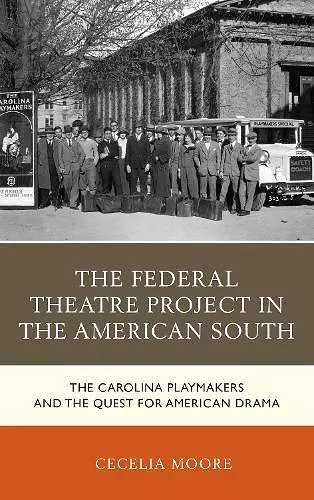The Federal Theatre Project in the American South
The Carolina Playmakers and the Quest for American Drama
Format:Hardback
Publisher:Lexington Books
Published:26th Sep '17
Currently unavailable, and unfortunately no date known when it will be back
This hardback is available in another edition too:
- Paperback£39.00(9781498526845)

The Federal Theatre Project in the American South introduces the people and projects that shaped the regional identity of the Federal Theatre Project. When college theatre director Hallie Flanagan became head of this New Deal era jobs program in 1935, she envisioned a national theatre comprised of a network of theatres across the country. A regional approach was more than organizational; it was a conceptual model for a national art. Flanagan was part of the little theatre movement that had already developed a new American drama drawn from the distinctive heritage of each region and which they believed would, collectively, illustrate a national identity. The Federal Theatre plan relied on a successful regional model – the folk drama program at the University of North Carolina, led by Frederick Koch and Paul Green. Through a unique partnership of public university, private philanthropy and community participation, Koch had developed a successful playwriting program and extension service that built community theatres throughout the state. North Carolina, along with the rest of the Southern region, seemed an unpromising place for government theatre. Racial segregation and conservative politics limited the Federal Theatre’s ability to experiment with new ideas in the region. Yet in North Carolina, the Project thrived. Amateur drama units became vibrant community theatres where whites and African Americans worked together. Project personnel launched The Lost Colony, one of the first so-called outdoor historical dramas that would become its own movement. The Federal Theatre sent unemployed dramatists, including future novelist Betty Smith, to the university to work with Koch and Green. They joined other playwrights, including African American writer Zora Neale Hurston, who came to North Carolina because of their own interest in folk drama. Their experience, told in this book, is a backdrop for each successive generation’s debates over government, cultural expression, art and identity in the American nation.
In this engaging book, Cecelia Moore uncovers a vibrant local theatre culture in a time and place when most would suspect those artistic wellsprings had gone dry: the Depression-era South. Moore offers a ground-level look at how, with a big assist from the federal government with the New Deal, people like Frederick Henry Koch, Paul Green, and Joseph B. Christmas labored mightily to introduce and make relevant live theatre to local audiences. Between 1935 and 1939 especially, playwrights and producers, and their benefactors in government and higher education, worked to create drama that would both test and enshrine elements of local history and folkways. Moore’s work successfully weaves together cultural and political history to show the possibilities—and the perils—inherent in the relationship between government and the artistic community. -- Charles J. Holden, St. Mary's College of Maryland
This study provides an excellent addition to the discussion of regional federal theatre programs that illustrates the vital link between the emerging folk theatre movement and the short-lived federal theatre project. It explores the interplay between Frederick Koch and Hallie Flanagan’s visions that emphasized regional American voices and the fraught political zeitgeist of the 1930s American South that ultimately brought the most successful of the WPA arts projects to an end. Of particular interest is the focus on the regional and national political machinations that sought to block the development of a southern federal theatre and thus impede the reach of the more progressive Roosevelt administration. Cecelia Moore has created a long overdue work through which the contributions of the southern federal theatre are able to emerge. -- John Poole, University of North Carolina at Greensboro
ISBN: 9781498526821
Dimensions: 239mm x 159mm x 21mm
Weight: 553g
232 pages